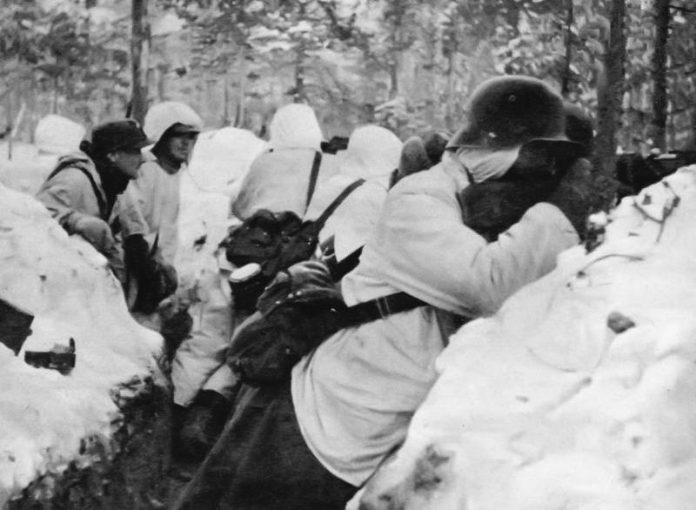 Finnish soldiers in the trenches near Suomussalmi during the Winter War
Finnish soldiers in the trenches near Suomussalmi during the Winter War
The winter war. Finnish government underestimates the enemy. It was concluded, that the USSR is a colossus with feet of clay. That Finland, even alone, can fight the USSR and defeat. Besides, there was confidence, that the Finns will support the international community.
A cure for stupidity
Soviet-Finnish War 1939–1940. looks like stupidity of the Finnish elite. And the victory of the USSR is a cure for stupidity. The reasonableness of Moscow's requirements for Helsinki was obvious to everyone, even the Finns themselves.
In anticipation of and with the outbreak of World War II, the Soviet government could no longer drag out a solution to the defense problem of Leningrad, the country's second most important vital center., with the issue of freedom of exit and actions of the Baltic Fleet (then the most powerful fleet of Russia). And with the loss of Leningrad ports, the enemy turned the Leningrad Region into a strategic bridgehead for invading deep into Russia.
Therefore, the Russian tsars attached such great importance to the defense of St. Petersburg and the approaches to it.. But then it was easier. Russia owned the Baltic states and the Grand Duchy of Finland. On the southern and northern shores of the Gulf of Finland were our batteries, The Baltic Fleet had several strong bases. The collapse of the Russian Empire led to a complete loss of these positions.. South coast left for Estonia, northern - beyond Finland. Baltic Fleet was, in fact, blocked in Kronstadt. Finnish long-range artillery could hit Kronstadt, our ships and the city.
Moscow conscientiously and by all means tried to agree with Helsinki. As soon as Hitler took Austria, so the USSR began to persuade Finland to be a good neighbor. Already in April 1938 Moscow secretly proposed Helsinki a local military alliance, that the Finns will resist the Germans, in case of their invasion of Finland, and the Soviet side promised help with troops, fleet, aviation and weapons. Finns refused.
Moscow began to look for options. Offered protection of the Finnish coast with the support of the Baltic Fleet, if Germany attacks Finland. Finns refused. Meanwhile, the situation in Europe continued to deteriorate. England and France surrendered to the Germans the Czechoslovak Sudetenland. Prague itself refused to defend itself. it became evident, that all agreements in the West are nothing more than paper, if there are no "big battalions" behind him.
Soviet government intensifies pressure on Finns. In October 1938 of the year, the USSR offers Finland assistance in building a military base on the Finnish island of Hogland in the Gulf of Finland and law, if the Finns cannot cope with the defense of this island, defend it together. Helsinki refused. Moscow asks for a lease for 30 years old she has several islands in the Gulf of Finland. Helsinki refuse.
Then spring 1939 Moscow offers a concession to much larger Soviet territory in exchange for islands in the Gulf of Finland. Finns themselves understood, that these are quite reasonable requirements, vital issue for Russia-USSR. Marshal Mannerheim, Commander-in-Chief of the Finnish Army, learning about these negotiations, invites the government to cede Moscow, exchange not only requested islands, but also the territory of the Karelian Isthmus. However, the Finnish government continued to stand its ground..
Interesting, what if Helsinki accepted Moscow’s proposals, then Finland and the whole nation only benefited from this. After all, it was not without reason that Mannerheim proposed himself as a person responsible for the exchange of territories.. His position as a hero of Finland would only be strengthened by this, as the country's territory at the suggestion of Moscow increased.
Besides, The USSR was ready for numerous economic advantages for a friendly neighboring state. However, the Finnish government carefully concealed the essence of the requests of the Soviet government, not only from the Finnish people, but also from the legislature. That is, the arguments of the Finnish government were so weak, that they could not be discussed not only in the press and society, but also in parliamentary commissions. Moscow's demands were quite reasonable and fair, and even moderate.
At first, Moscow did not stutter about the transfer of the Karelian Isthmus to the USSR, although this step was also quite logical and fair. But after that, how Helsinki refused to concede even in the smallest, Moscow tightened requirements. It became completely obvious, that in a future war Finland will side with the enemies of Russia.
Then Moscow formulated new conditions: lease to the Union for 30 years piece of land on the Hanko Peninsula (at the entrance to the Gulf of Finland) in order to create a Soviet military base there and transfer the border on the Karelian Isthmus to the Mannerheim Line in exchange for a significantly larger Soviet territory. And, Cape Hanko remained the main request. Moscow was ready to make concessions on the issue of moving the border from Leningrad (move less, than 70 km).
Soviet-Finnish negotiations were conducted in the fall 1939 of the year, already at the start of the great war in Europe. The importance of negotiations for Moscow is evidenced by the fact, that Stalin personally spoke with the Finns. So Molotov negotiated with the Germans, although they also had strategic importance for the USSR. What Stalin just did not offer the Finns:
— lands in Karelia (their Finns tried to capture in 1918-1922.);
— monetary compensation for property on the Karelian Isthmus;
— economic benefits;
— mutual trade concessions.
When the Finnish side declared, that can not tolerate a foreign base on its territory, Stalin proposed to dig a canal across the Hanko Peninsula and make the base an island, He proposed to buy a piece of land on the cape and thereby make Soviet territory. Then the Finns were offered to buy from them several small uninhabited islands at Cape Hanko, about which members of the Finnish delegation did not even know. All in vain!
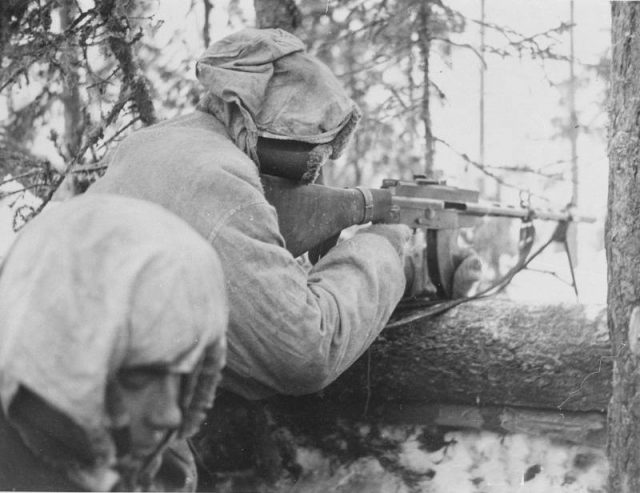 Finnish machine gunner with a Finnish machine gun Lahti-Saloranta M-26
Finnish machine gunner with a Finnish machine gun Lahti-Saloranta M-26
Why did the Finns believe in victory
Negotiations show, that the Finnish government had iron confidence in victory in a possible war with the USSR. Therefore, the Finnish side did not make any concessions, and apparently, was looking for war. Only the war went in a different scenario, not according to Helsinki's plan.
The Finnish elite made two major mistakes:
— At first, underestimated the enemy. It must be remembered, that the victorious Soviet Union of the sample 1945 years and Soviet Russia 1920 g. — the first half of the 1930s are two different countries. Finns remembered Russia of the sample of the 20s. Country, which barely escaped death during the Russian unrest and intervention, who lost the war to Poland and lost huge western Russian regions. Country, which without a fight surrendered the entire Baltic. the Soviet government, which turned a blind eye to the genocide of Russians in Finland, to destroy the red Finns, on the robbery of Russian property, into two aggressive wars, which the Finns unleashed against Russia.
Hitler's definition of the USSR, how the “colossus with feet of clay” was then dominant in the West. It is worth remembering, what is the same strategic mistake, like Finland in the fall 1939 of the year, in summer 1941 years will make the Third Reich. Hitler’s elite was sure, that will defeat Russia before winter. During the lightning war. That the Russian colossus will fall apart under the blows of the “invincible” Wehrmacht, that Russia will collapse under the yoke of problems, due to the actions of the “fifth column”, military conspirators and separatists.
The whole West slept through those huge changes, that occurred in Russia-USSR in just a few years. The Stalinist USSR was already a qualitatively different power: with a powerful, albeit a crude army, which still had to be tempered in the fire of a terrible war; with developed industry and defense industry, high scientific, technical and educational potential. The people have become different, the core of the society of the future arose in the country. True patriots, clever, healthy, ready for self-sacrifice.
All Finnish intelligence was then conducted through Soviet dissidents, and they hated the Union, were interested in a corresponding distortion of reality. Finnish secret police on the eve of the war reported to the government, that most of the population of the USSR (75%) hates power. That is, a conclusion was drawn, that it is only necessary to enter the Soviet lands, how the population will meet the "liberators" with bread and salt.
Finnish General Staff, analyzing Blucher's slurred actions in the Hassan conflict, made a conclusion, that the Red Army cannot not only advance, but competently defend. As a result, the Finnish government concluded, that Finland, even alone, can fight the USSR and defeat. But most likely the West will come to the aid of Finland.
— Secondly, in Helsinki were sure, that they will be supported by Western democracies. These calculations had real reasons.. France and England at that time waged a “strange” war with Germany. That is, there was no real war. Allies were waiting, when Hitler turns the bayonets east, against the USSR. London not only did not restrain Helsinki from war with the USSR, conversely, incited Finns in Russian. The British wanted to take the Kola Peninsula from the Russians. They themselves did not want to fight, but as usual used "cannon fodder" - Finnish.
In January 1940 Chief of Staff of England General E. Ironside presented to the war cabinet a memorandum on "The main strategy of war". In it he noted, that the allies can help Finland effectively "only if, if we attack Russia from as many directions as possible and, which is especially important, strike at Baku - oil production area, to cause a serious state crisis in Russia». That is, London was ready for war with Russia.
Similar positions were held in France.. In the end of January 1940 French General Commander M. D. Gamelin expressed confidence, what during the campaign 1940 Germany will not attack allies, therefore, it is possible to land the Anglo-French Expeditionary Force in Pechenga (Petsamo) and compatibility with the Finnish army to deploy active military operations against the USSR.
The British government, in principle, was ready to go to war with the Russians. «Developments, apparently, lead to, Chamberlain said 29 January at a cabinet meeting, — that the allies will openly engage in military operations against Russia». In early February, the English Prime Minister went to Paris, to the highest military council. It discussed a specific plan for a joint intervention in Northern Europe. Chamberlain proposed landing expeditionary forces in Norway and Sweden, what would expand the Soviet-Finnish conflict, prevented the defeat of Finland by Russians and at the same time blocked the supply of Swedish ore to Germany.
The head of the French government Daladier supported this plan. Not only French troops planned to send to Scandinavia and Finland, but also English divisions, who formed to send to the French front.
Also in Paris and London hatched the idea of organizing an offensive against Russia "giant ticks": blow from the north (including the capture of Leningrad) and a blow from the south (from the Caucasus). Petsama operation involved a landing of more 100 thousand. Anglo-French troops in Scandinavia. The landing force in Petsamo was supposed to capture the Murmansk railway and Murmansk, and thereby receive maritime communications to supply troops and a railway to develop the offensive to the south.
Allies also prepared the Air Force for attacks from bases in Syria and Iraq in Baku, Batumi and Grozny. Only the victory of the Red Army in February - March, unexpected for the West 1940 years forced England and France to postpone the blow to the USSR until better times.
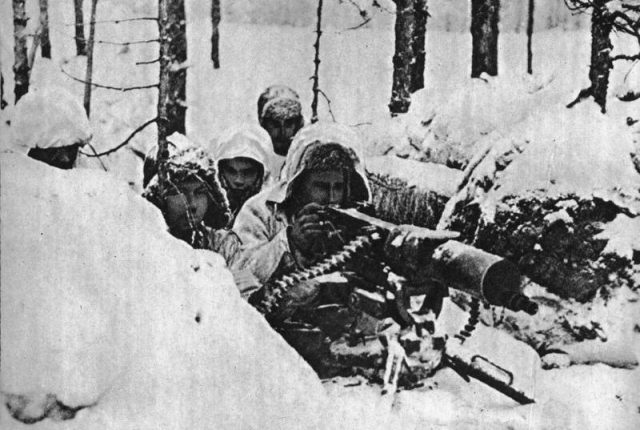 Finnish soldiers with a machine gun "Maxim" M / 32-33 in the forest
Finnish soldiers with a machine gun "Maxim" M / 32-33 in the forest
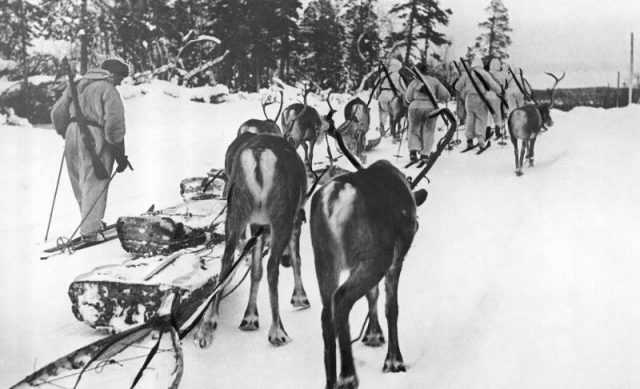 Soldiers of the Finnish troops ski battalion on the march. For transportation of cargo deer and drags are used.
Soldiers of the Finnish troops ski battalion on the march. For transportation of cargo deer and drags are used.
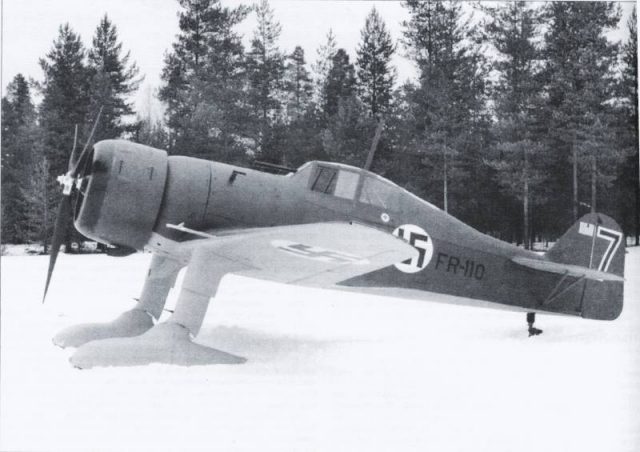 Fighter of the Dutch development Fokker D XXI No. FR-110 of the Finnish Air Force on a ski chassis
Fighter of the Dutch development Fokker D XXI No. FR-110 of the Finnish Air Force on a ski chassis
War so war
In this way, London and Paris prepared a completely different scenario for World War II - England, France and Finland (possibly other countries) against the USSR. Having great powers behind and underestimating the Russians, Finns were overwhelmed with optimism and even plans for war with the USSR prepared exclusively offensive. According to these plans, the Mannerheim line was supposed to repel the onslaught of the enemy in a southerly direction, and the Finnish army attacked eastward, in Karelia.
Finland was going to establish a new border with Russia along the Neva, southern shore of Lake Ladoga, Play, Lake Onega and further to the White Sea and the Arctic Ocean, with the inclusion of the Kola Peninsula. That is, “peaceful” Finland was preparing to double its territory. Only after the start of the war did you have to forget about the offensive. The first operations showed, that the Red Army group in Karelia is too powerful, to tread.
So the Finnish elite, dreaming of creating "Great Finland" at the expense of Russian lands, made a huge mistake. Hitler later committed it.. Admonition for Finland and Germany will be the defeat in the war and the victory of the Russians. Vyborg will become Russian again, and then Kaliningrad.
It should also pay attention to the fact, what is Finland in winter 1939 years was ready for war, but the USSR - no. Since Moscow did not want to fight the Finns, and Helsinki wanted war and prepared for it seriously. Finland preparing for war during autumn talks: evacuated the population of their border areas, mobilized the army. Mannerheim joyfully noted in his memoirs:
«…I wanted to shout, that the first round was ours. Like cover troops, and we were able to transfer the field army on time and in excellent condition to the front. We got enough time (4-6 weeks) for combat training of troops, introducing them to the area, to continue the construction of field fortifications, destruction work, as well as for setting mines and organizing minefields».
By the end of November 1939 g. Finns have been ready for war for two months now, and Moscow pulled everything, tried to negotiate.
The result is a provocation, and the Red Army begins to admonish obstinate and aggressive Finns. The initial stage was difficult: Finland was ready for war, but the USSR - no. Soviet command underestimated the enemy, intelligence made major miscalculations, the terrain was difficult, winter time, powerful enemy defense. Red Army was poorly trained.
Finns high morale, unlike the Poles, who surrendered almost immediately to the Germans, northerners fought hard and hard. The Finnish command fought skillfully and decisively. However, Russians can draw conclusions from mistakes. At the second stage of the war, the Finnish army was defeated, hacked defense, Finland was on the verge of disaster and asked for peace. Moscow got everything she wanted and more.
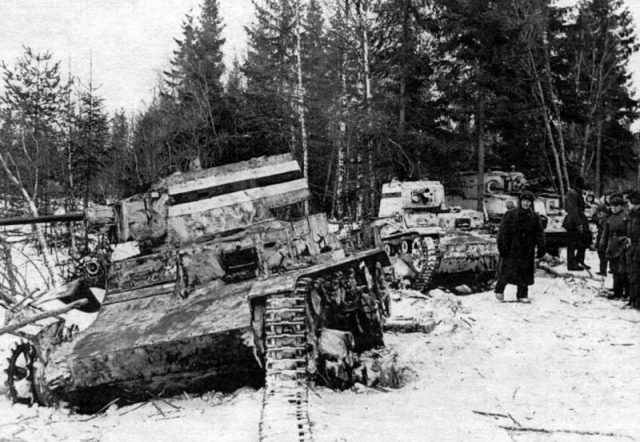 Finnish Vickers tanks, padded in the area of the Perot station. February 1940 g.
Finnish Vickers tanks, padded in the area of the Perot station. February 1940 g.
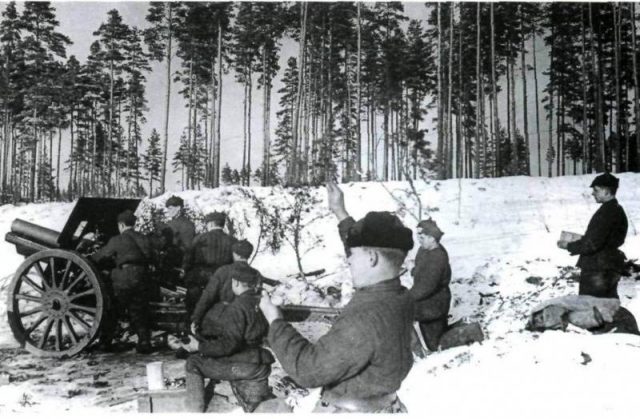 Calculation of the Soviet 122-mm howitzer sample 1910/30 gg. in position during the winter war.
Calculation of the Soviet 122-mm howitzer sample 1910/30 gg. in position during the winter war.
/Alexander Samsonov, topwar.ru/











